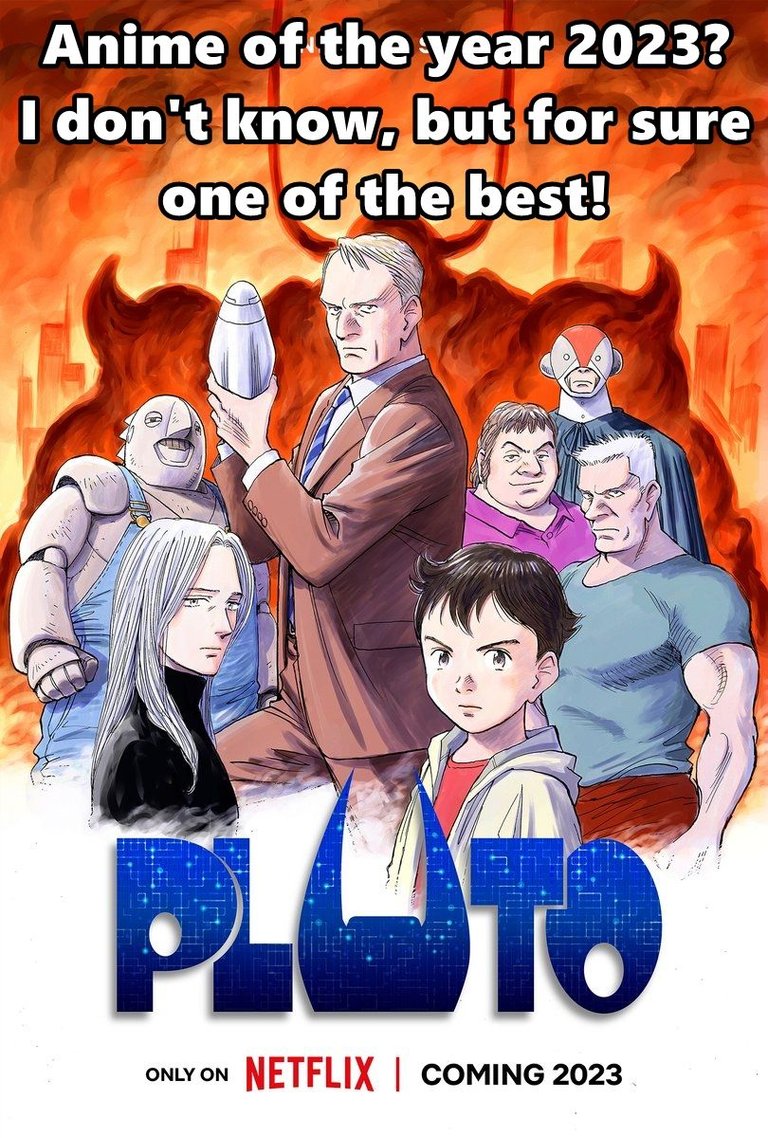
Many people make fun of anime. The older I get, the better I understand why. The voice actors are too loud and speak an incomprehensible language. There is too much porn or erotic themes that can cause cringe, embarrassment, or otherwise uncool friendships. The plot, ideas and characters can be strange, even for nerds, let alone for those who already have an opinion about these devices. On the other hand, I also see that there are cultural differences, the Japanese have very mature works that still have a gigantic influence on the world cinematography, resulting from many great independents and all people. Christopher Nolan, James Gunn, Darren Aronofsky and Guillermo del Toro - especially the last ten are important to this friend. Del Toro adapted Monster into high-budget Hollywood films several times. Unfortunately, to no avail. Typically, I talk about such situations about Akira Toriyama and his DBZ, but there are also others. Hayao Miyazaki - Japanese Walt Disney, one of the greatest directors of films for children and teenagers in history. Mamoru Oshi - the man who created the Ghost in the Shell anime. You may have different opinions about his earlier and later work, but both films and anime series are absolute genius and were certainly not a coincidence (btw, they are still damn good to this day!!!). GitS had a huge impact on pop culture, human minds, cyberpunk and more. Shinchiro Watanabe - I don't like him, nor his anime, but I appreciate the skill and reputation he has gained over the years. The late Satoshi Kon, who can cope with drama, sadness, despair, pain, suffering (and emotions that are their opposite), so that even if the bad boy will have his head torn off after his films or the series Paranoia Agent. Also Mamoru Hosoda - I still have a bad taste in my mouth after his last film (Belle, God, what a cheesy thing that was...), but we are just something that can happen. Especially since his other two are at least very good - Mirai, Wolf Children, Summer Wars, Toki O Kakeru Shojo. Am I curious? Well, read until the end, because I will prove that there are anime that are unrelated to the best cinematic stories!
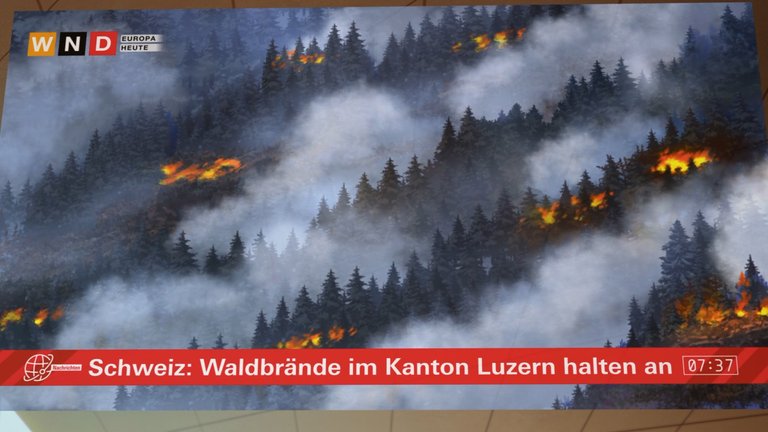
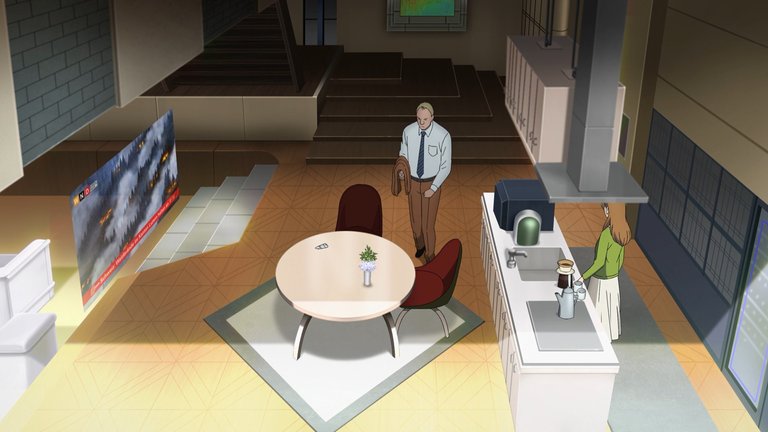
This group includes Naoki Urasawa and Osamu Tezuka. I'll start with the second one - he's the God of anime. He was a man who is as important to this field of culture as Pablo Escobar is to cocaine lovers. Forgive me for the simplified explanation, but I have never been attracted to his work (apart from my childhood, when a few of his anime were broadcast on Polish television or there were pirated versions on VHS cassettes), and I wanted to simply and clearly point out what caliber of creator the late Osamu Tezuka was . Mr. Urasawa is another great creator. As I wrote in the previous paragraph, his Monster is such an outstanding and moving story that Del Toro spent years (!) lobbying and following people in Hollywood so that the producers would give this story a chance. Maybe after Pluto it will change. That would be beautiful, because this story has not become outdated in the slightest! In fact, you can even say that it is gaining! There is one more thing - I watched this anime (Pluto) irregularly, i.e. not every day. Sometimes even a week or 10 days passed between one episode and the next. That's why I didn't remember some things completely, which I clearly noted for one or two things.
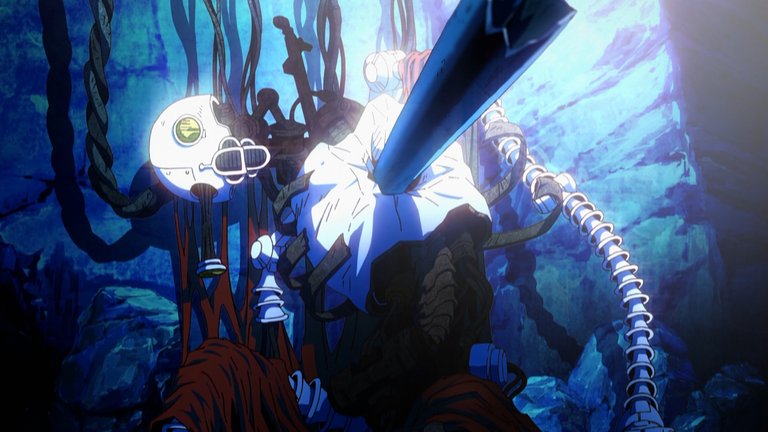
Today, however, I will talk about another title by this author. Pluto is a reinterpretation of one of Osamu Tezuka's stories (you probably know Astro Boy. If not... it's like you don't know Rocky, Rambo or Goku). We're talking about the "Largest Robot in the World". The title was inspired by the name of the main antagonist. Takashi Nagasaki and Osamu Tezuka's son, Makoto Tezuka (he supervised the production of the anime), also participated in this story. The world presented in Pluto is clearly associated with The Creator, the Russian series Better Than Us (available on Netflix), Blade Runner or "I, Robot". In some individual aspects, this anime shares common themes with Dark (a series on Netflix - I highly recommend it!!!) and Killers of the Flower Moon. Thanks to the development of technology, robots are no longer soulless machines like in our world. You could say they have a soul or something like that. They live, work, have children, their own dreams, their own rights. Some of them are weapons of mass destruction that can have similar effects to an atomic bomb. That is, it is a threat to others, and if the threat does not work, piles of massacred civilians and devastated cities will do the same. The robots are different - we have martial arts masters, a machine that in a few minutes will turn an army into minced meat a la fatality in MK games, Astro Boy (mini-Superman), Epsilon using the power of the sun.
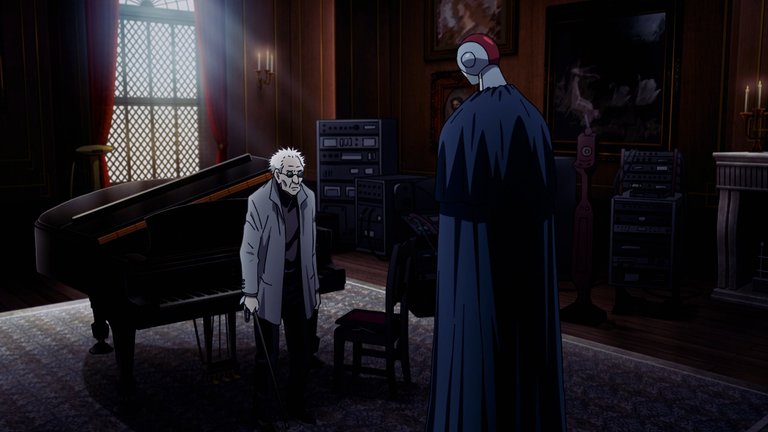
There is also Gesicht, our protagonist. It is a robot created for the special needs of Europol. As it was said in the anime "Gesicht is the largest investment in the history of Europol". It is constructed of Zeronium, a unique metal alloy that also serves as its main weapon. His brain is an extremely advanced A.I. Gesicht was designed for various detective and offensive tasks. His new mission is to discover the mystery of who is behind the murder of robots that could act as weapons of mass destruction and people fighting for their rights, their creators, etc. The victims always look the same, they have characteristic horns embedded in their bodies or are located nearby. The matter becomes more complicated when it turns out that this is another case (the first in 8 years) in which a robot violated its procedures and murdered a human. At this point I've finished detailing the plot. I don't want to spoil it for you. It's true that it's not a complicated story full of plot twists that will twist your brains inside out, but you can see that the author had a specific vision that he stuck to until the very end. There were some things I didn't really like, and there were a few moments when I couldn't help but let out a whimper of disappointment, but it's like I'm picking on DBZ for being mostly combat-based. My girlfriend was a bit more grumpy, but she doesn't like anime. Despite this, the story engaged her and she really got into some of the threads (although to compensate, I will add that some of them were boring for her and if she had watched it without me, she would have abandoned this title). It was also a good opportunity to explain some of the bad things in our world - wars, politics, terrorism, the conflict in Afghanistan, Iraq, the elimination of Mu'ammar al-Kaddafi (and the consequences of these events).
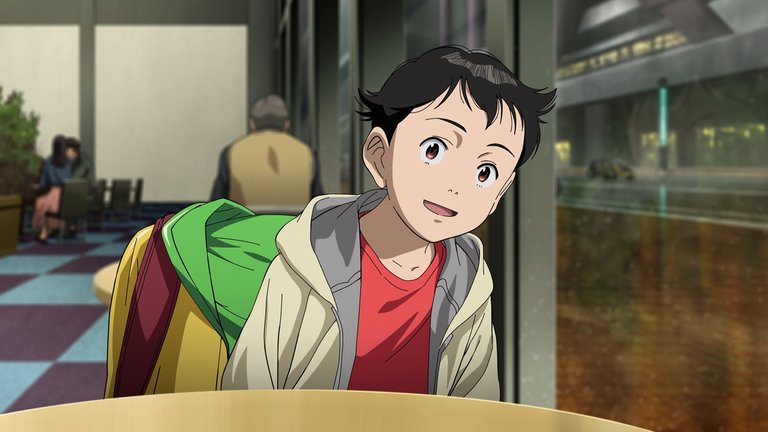
However, before I move on to my hobby, which is politics, a few words about psychology. Yes, this aspect was also perfectly presented in this title. I don't want to talk about many things. Why? Because I figured out quite quickly what the reason for Pluto's anger was, and this thread is very important for the whole story and is connected with other threads. However, I can praise how Naoki presented empathy using the examples of Epsilion and Uranus, Astro Boy's sister. Oh no, that's a spoiler too... Okay, so I'll limit myself to Uranus and one thread unrelated to the Solar Robot. Uranus isn't super strong like the others, but she has something different. It is a highly developed empathy or feminine sixth sense, but powered by a state-of-the-art nuclear power plant. The girl senses suffering and sad individuals with about the same efficiency as Superman in the comics. Some scenes with her moved me so much that I couldn't hold back tears. It is even stronger in the case of the relationship between robots (the protagonist and his robot wife) and people and robots. It's true that I didn't cry in front of all of them, but the scene of two robots mourning the death of their child shocked me deeply (just like the finale of Perfect Blue from Satoshi Kon, but on a smaller scale compared to PB). It was similar with the monologue of Mont Blance, one of the Seven Special Robots. I cried during all the scenes involving children. It doesn't matter if they are metal with an artificial soul or made of flesh and blood. They were strong on every level. I also really liked how Naoki presented the need to know good and evil. To have a full perspective on life, emotions, etc. you need to know both sides of the coin. In the same way as a terrorist <-> anti-terrorist, hacker <-> person responsible for security. If we want to be effective as a terrorist, anti-terrorist, hacker and anti-hacker, we need to understand both perspectives to know the mindset of that person. I don't know if I can say that I haven't seen anyone present this thread so well, but it's definitely one of the better examples I know.
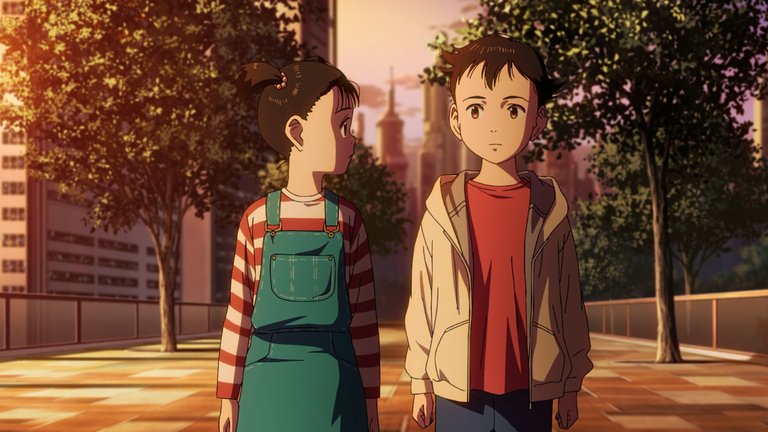
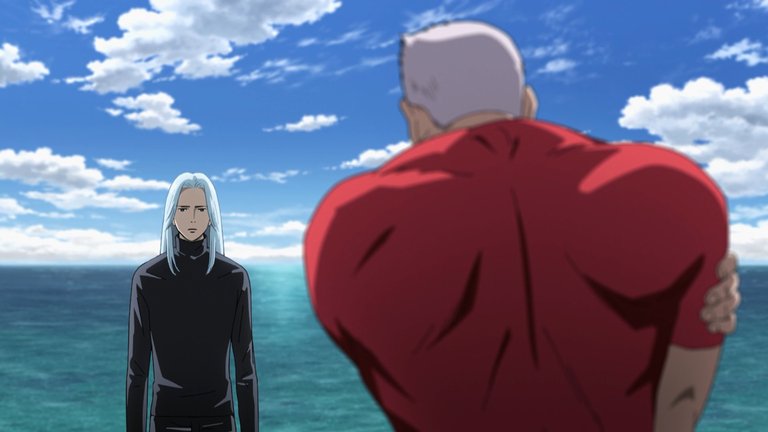
One of the key threads (not to say the most important, essential for the entire story) is an event that took place before the comic book began. It is about the 39th war in Central Asia. Darius XIV (i.e. Muamar of Libya) used new technological achievements to expand the territory of his state. For this purpose, he created an army of robots. The USA did not like this, as they did not want changes on the political map of the world + preferred to suppress any possible competitor/state that could weaken their interests. They did it in their own style - brutally, without fucking dancing with anyone. I understand the approach of the author of Pluto, but for some time I considered the USA to be evil. But the USA is what it is and there are much worse countries. Despite everything, I prefer that we are ruled by the current hegemon rather than, for example, China or Russia. What I'm saying is not a matter of preference. It's not even a choice, it's common sense! If only understood in such a way that it is better to obey a bandit who has any principles than those who do not. The consequences of the 39th war in Central Asia include a lot of orphans, destroyed cities, people who lost all their belongings, PTSD among robots, soldiers, medics and other people working on the front line. So just like after Afghanistan and Iraq.
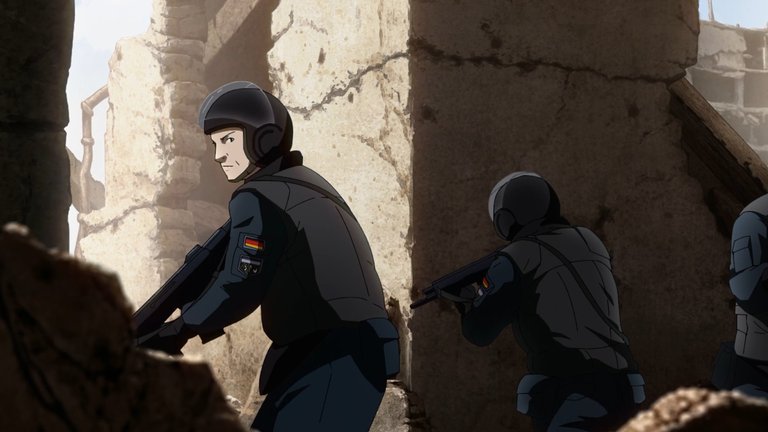
Naoki Urasawa masterfully showed the drama of war. This time on real examples. Once upon a time, there was a website called B3stG0r3 (the name was censored because Peakd once had a certain... problem with one of my entries, where I described this now-defunct website in more detail), where you could see scenes straight from this anime. Although I don't remember a bloody cradle and a father whose soul is shattered into pieces after seeing his child in the form of a portion of tomato soup, but I have seen something similar. A mother who was in severe shock, holding a headless baby because some son of a bitch, a sniper, aimed straight at his tiny head (during the conflict in Syria and Israel - Palestine a dozen or so years ago, it was similar, or at least I read such information). Or how, in front of children who were 8 or 10 years old, they drilled holes in their parents' brains (or, conversely, the parents were pinned to the Earth, like Guts in Berserk during Eclipse). Here they didn't show it to us directly, but it was very clearly suggested by the cradle scene, short scenes of armed conflicts, statements by Epsilion, Mont Blanc and others. I don't know how to end this paragraph, so I will refer to the statement of my friend Desther, with whom (the three of us... or rather me and Desther were the guests xD) we recorded a podcast about the adaptation of the One Piece manga. Desther commented on my explanation of one of the few stupid motifs in this series (I recommend it, the best anime adaptation!!!) something like this: "When I was listening to you, I was automatically nodding my head as I heard thoughts similar to those in my head." Same. I was nodding my head when I saw how Naoki Urasawa presented politics, wars, society, people, law, relationships between us, people's racism, sometimes our (I'm not talking about us, just our species) vile actions towards some minority or group that we don't like. I will not give specific examples (apart from those I have already given + those I wrote down in the form of notes), because there are too many. If you have been following my blog for some time, you know that I like such titles.
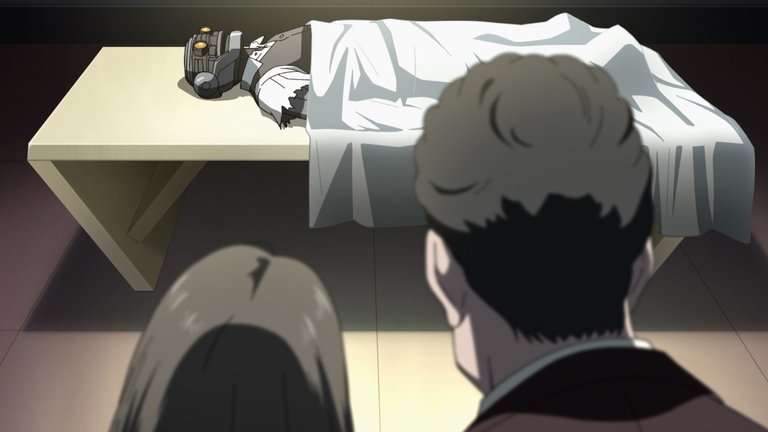
The scenes depicting the political layer of wars were equally strong. Oh boy, if, like me, you follow psychology, politics, wars in the context of the last 50 years, you will find a lot of references to various things. Some scenes (interrogation of the King of Persia at the UN headquarters, King Darius in prison) reminded me of various scenes and symbolic photos that I saw on TV, books, school textbooks, etc. during my childhood. At least a few times, I found myself saying, "Hey! I know that from somewhere!" And when I saw the scenes from the interrogations, I literally saw some of my textbooks with photos of Slobodan Milošević answering to the international commission. I also remembered various scenes from the Israel vs. Palestine conflict from several years ago. Or photos from Iraq or Afghanistan. Both those showing happy/aggressive Muslims and UN soldiers in a similar context. Not to mention the victims and their sadness. I don't want to lie, but something comes to my mind as I was explaining one scene to my girlfriend. It was a reference to the famous case (or rather several "incidents") in which a drone massacred civilians or shot some people during a wedding. The author of the comic book does not hide his views on the invasion of Iraq. While I may disagree with his opinion regarding the decision itself, when it comes to this type of actions - he has my full support. I suspect that this may be partly due to the fact that the Japanese cooperate quite actively with Arab countries (they took a lot of oil from them + the Japanese have a very well-developed diplomacy, as my country also found out, even before regaining independence). Let me say right away that I don't know anything about this, so don't believe me 100%. I rely on my knowledge and, above all, the statements of people who commented on Pluto many years before the Netflix adaptation was created. Link at the end of the review. There is definitely something to it, because even I felt that the author referred to Libya and their dictator a bit too positively and one-sidedly. And let's not forget that the Americans more than once (pardon my French, you have to call it by its name) hit the Japanese with a metal beam, just like Superman did to General Zodd. Only with better results, because the Japanese in this comparison do not have jaws made of steel. Atomic bombs, two decades of economic development wasted (imagine that much / most of what your country produced for 20 years was flushed down the toilet, and you had nothing to do with it). you don't have this - slower wage growth, higher taxes, the need to work longer and harder), treating them for a long time like obedient mongrels. This matters too.
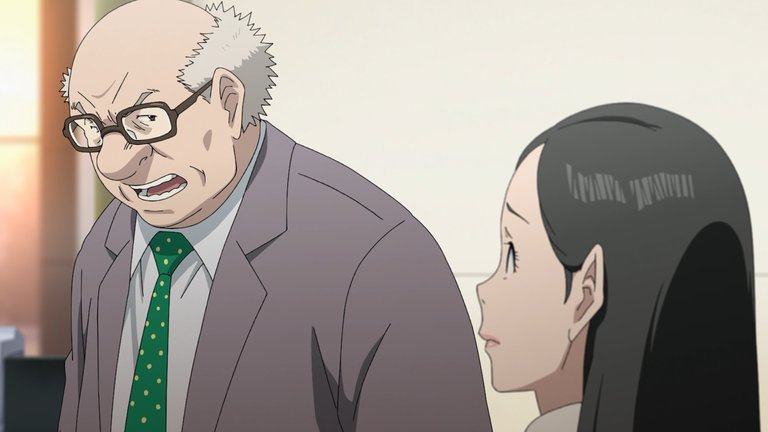
Ok, now for purely technical issues. Since this text is already long, I will not write my full impressions. Besides, I don't know much about music, drawing, etc. that my opinions in these areas are valuable. Composer Yugo Kanno is responsible for the soundtrack. I only associate him with Jojo's Bizarre Adventure, Psycho Pass and Ajin: Demi Human. The soundtrack to Pluto may not be a work of art, but it is definitely one of the better ones. Similarly to the soundtracks for the above-mentioned titles. I liked some songs less than others (especially touching or sublime/epic ones like Shadows on the Sand, Panic Sense, Spirit of Love and more), but each of them fit the context (emotions, setting) thematically and compositionally. They are different from each other, they emphasize what we see on the screen very well. After this paragraph, it may seem that I don't like this soundtrack or that I find it only okay. Nothing like that, it's very good. It seems to me that he is close to being called exceptionally good. I missed a few strong songs that would be clearly associated with Pluto, something like Pave Your Way from Tekken 8. But we got a dozen good ones. I rate the music a solid 8.5/10.
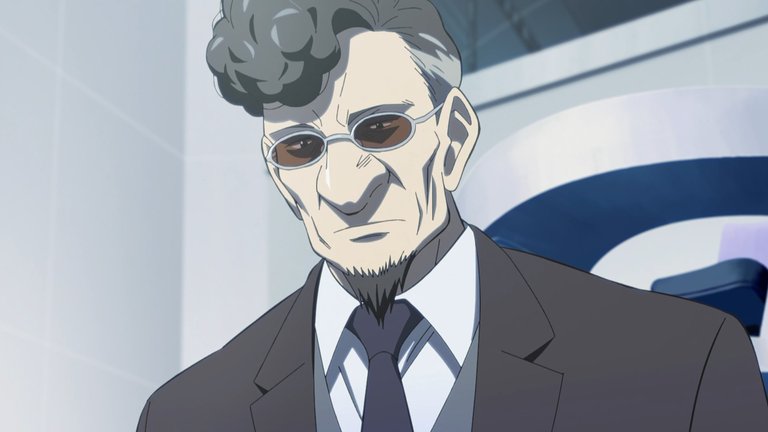
In terms of graphics, lines and animation, this is the most beautiful anime created for Netflix that I have ever seen. Not every scene is impressive, sometimes savings are visible (the animation could be smoother and more accurate, more objects could move, sometimes the images are too static - a standard known in anime), but they are not frequent or noticeable enough for me to have a real reason to complain. However, there is one and only thing that really bothered me during the screening. It was not a mistake, but the author's vision. I will tell you directly what it is about, but without any obvious spoilers. Robot fights are shown here in an unusual way. I knew what I was signing up for, because I had heard about it 10 years ago, when I encountered Pluto for the first time. I watched my partner's reaction. Initially, she was as interested as I was (I knew WHAT I would see, but I didn't know HOW it would be shown), but she got angry faster than me. I don't blame her because I was disappointed too. The first season of Baki was better animated (the Netflix one, some characters in some episodes don't even move like characters in most anime. Total minimalism was chosen), and here they had more opportunities and could show more. I know, it would spoil the adaptation a bit (the anime is apparently a very faithful adaptation of the comic, although a few things were changed), but on the other hand, we would get another big plus for the series. Especially since at some point there was no longer any reason to show the fights in this form.
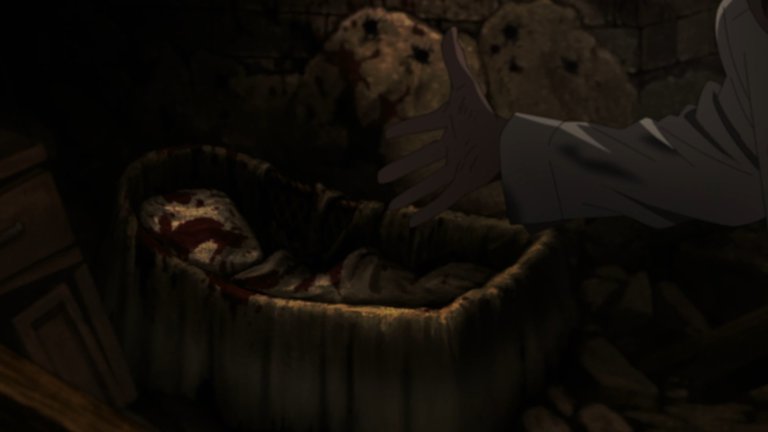
To sum up, last year I saw the most new anime in the last few years. Mainly they were simple, relaxing titles like Kengan Ashura, Baki, two seasons of Bleach, two Detective Conan movies (Karol, I don't compare them with the above, but Conan is still less popular than DBZ in the world, hehe. Inside joke anyway .). That's why it's good that I watched something from the other extreme, a title that focuses primarily on the plot and forces reflection. I really liked the plot of the title character for two reasons. I can identify with it and it's something I haven't seen in movies, games, TV series or books before. Or to put it another way, I remember seeing similar threads, but they were not explained and shown in as much detail as in Pluto. I also really liked the strong emphasis on topics I like. There are not as many of them as in Legend of the Galactic Heroes or Kingdom, but this is due to the specificity of the series. Kingdom and LotGH had much more space for this + the general policy was more important there, which could be branched out into more specific, and for me general, aspects. In the sense that Pluto focuses on specific issues, those that it needs to tell the story, and not a closer presentation of ideology, diplomacy, dealings, differences in state management, bureaucracy, and treatment of citizens. Pluto, however, has other advantages. I can't wait for the next season! My rating is 9/10.
https://www.iias.asia/the-newsletter/article/relations-between-japan-middle-east
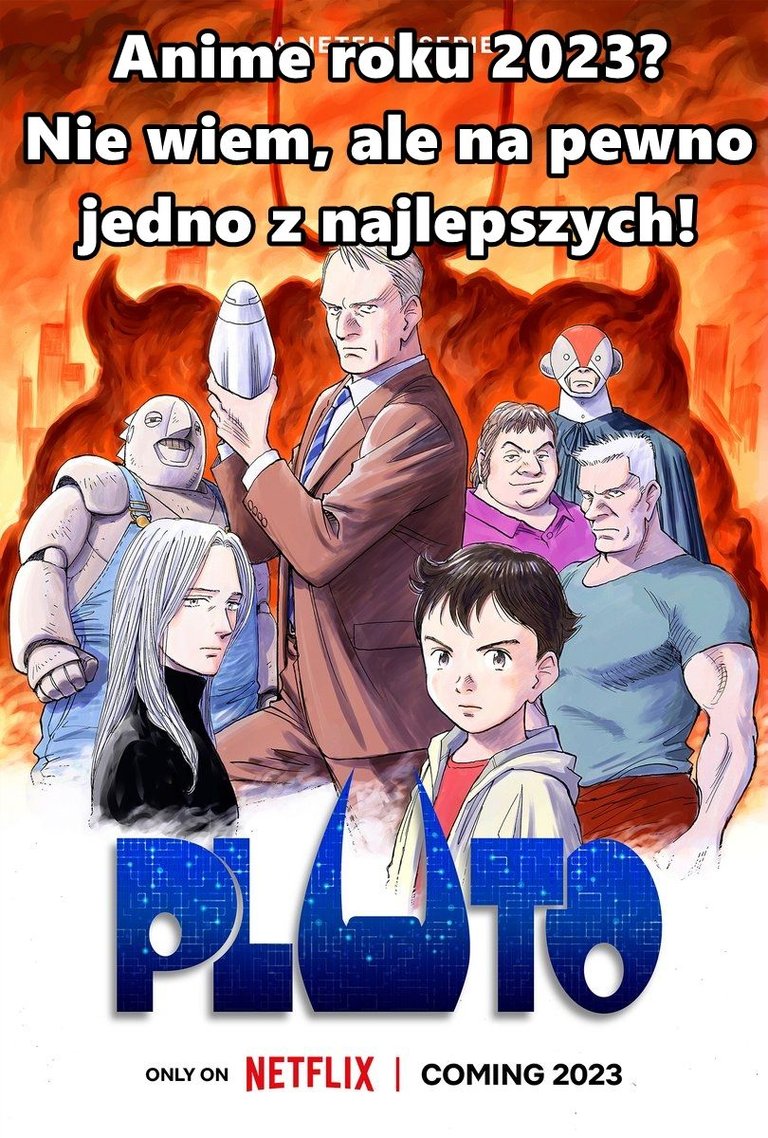
Wielu ludzi wyśmiewa anime. Im jestem starszy, tym lepiej rozumiem dlaczego. Aktorzy głosowi są zbyt krzykliwi i mówią niezrozumiałym językiem. Jest zbyt dużo porno lub erotycznych motywów, które mogą wywoływać cringe, zakłopotanie lub inne, nie fajne uczucie. Fabuła, pomysły i postacie czasem bywają dziwaczne nawet dla nerdów, a co dopiero dla tych, którzy mają już wyrobione zdanie o tych kreskówkach. Z drugiej strony, widzę też że pomimo różnic kulturowych, Japończycy tworzą bardzo dojrzałe dzieła, które miały i nadal mają gigantyczny wpływ na światową kinematografię, inspirując wielu wielkich twórców i wszystkich ludzi. Christopher Nolan, James Gunn, Darren Aronofsky i Guillermo del Toro - szczególnie ten ostatni jest ważny dla tej recenzji. Del Toro kilkukrotnie próbował zaadaptować Monster na wysokobudżetowy Hollywoodzki film. Niestety bezskutecznie. Standardowo mówię przy takich sytuacjach o Akirze Toriyamie i jego DBZ, ale są też inni. Hayao Miyazaki - japoński Walt Disney, jeden z najwybitniejszych reżyserów filmów dla dzieci i młodzieży w historii. Mamoru Oshi - człowiek który stworzył anime Ghost in the Shell. Można mieć różne zdanie na temat jego wcześniejszej i późniejszej twórczości, ale oba filmy i serie anime to absolutny geniusz, które na pewno nie były dziełem przypadku (btw. do dzisiaj są cholernie dobre!!!). GitS miał gigantyczny wpływ na popkulturę, umysły twórców, cyberpunk i nie tylko. Shinchiro Watanabe - jego nie lubię, tak samo jego anime, ale doceniam za umiejętności i renomę, jaką sobie wyrobił przez lata. Świętej pamięci Satoshi Kon, który potrafi tak doskonale posługiwać się dramatem, smutkiem, rozpaczą, bólem, cierpieniem (oraz emocjami, które są ich przeciwieństwem), że nawet największy badboy będzie miał zryty łeb po jego filmach lub serialu Paranoia Agent. Jeszcze Mamoru Hosoda - nadal mam niesmak po jego ostatnim filmie (Belle, Boże jaka to była tandeta...), no ale jesteśmy tylko ludźmi i każdemu się może zdarzyć. Tym bardziej, że jego pozostałe twory są co najmniej bardzo dobre - Mirai, Wolf Children, Summer Wars, Toki O Kakeru Shojo. Zaciekawiłem? No to czytajcie recenzję do końca, bo udowodnię Wam, że są anime, które nie mają powodu do wstydu względem najlepszych kinowych historii!


Do tej grupy należy Naoki Urasawa oraz Osamu Tezuka. Zacznę od tego drugiego - to taki Bóg anime. Był to człowiek, który ma takie znaczenie dla tej dziedziny kultury, tak jak Pablo Escobar dla miłośników kokainy. Wybaczcie za uproszczone wyjaśnienie, ale nigdy nie ciągnęło mnie do jego twórczości (poza okresem dzieciństwa, gdy parę jego anime leciało w polskiej telewizji lub były pirackie wersje na kasetach VHS), a chciałem prosto i wyraźnie zaznaczyć, jakim kalibrem twórcy był świętej pamięci Osamu Tezuka. Pan Urasawa to kolejny wielki twórca. Jak napisałem w poprzednim akapicie, jego Monster jest tak wybitną i poruszającą historią, że Del Toro przez lata (!) lobbował i chodził za ludźmi w Hollywood, by producenci dali szansę tej historii. Może po Pluto się zmieni. To byłoby piękne, bo ta opowieść nie zdezaktualizowała się ani trochę! Ba, można nawet powiedzieć, że zyskuje! Jest jeszcze jedna rzecz - oglądałem to anime (Pluto) nieregularnie, czyli nie codziennie. Czasem nawet mijał tydzień lub 10 dni między jednym a drugim odcinkiem. Dlatego pewnych rzeczy nie zapamiętałem do końca, co wyraźnie zaznaczyłem przy jednym lub dwóch kwestiach.

Dzisiaj jednak pomówię o innym tytule tego autora. Pluto to reinterpretacja jednej z opowieści Osamu Tezuki (na pewno kojarzycie Astro Boya. Jeśli nie... to tak jakbyście nie znali Rocky'ego, Rambo albo Goku). Mowa o "Największym Robocie Na Świecie". Tytuł zaś został zainspirowany imieniem głównego antagonisty. Swój współudział w tej historii mieli również Takashi Nagasaki oraz syn Osamu Tezuki, Makoto Tezuka (nadzorował produkcję anime). Świat przedstawiony w Pluto jednoznacznie kojarzy się z The Creator, Rosyjskim serialem Better Than Us (można zobaczyć na Netflix), Blade Runner lub "I, Robot". W pewnych pojedynczych kwestiach, to anime ma wspólne motywy, co Dark (serial na Netflix - bardzo polecam!!!) oraz Killers of the Flower Moon. Dzięki rozwojowi technologii, roboty nie są już bezdusznymi maszynami, jak w naszym świecie. Można powiedzieć, że mają duszę lub coś w tym stylu. Żyją, pracują, mają dzieci, swoje marzenia, własne prawa. Niektóre z nich są bronią masowego rażenia, która może wywołać podobne skutki, co bomba atomowa. Czyli straszak na innych, a jak groźba nie poskutkuje, to zrobią to stosy zmasakrowanych cywili i zdewastowane miasta. Roboty są różne - mamy mistrzów sztuk walki, maszynę która w kilka minut zrobi z armii mięso mielone a'la fatality w grach MK, Astro Boya (mini-Superman), Epsilona wykorzystującego moc słońca.

Jest jeszcze Gesicht, czyli nasz protagonista. Jest to robot stworzony na specjalne potrzeby Europolu. Jak to powiedziano w anime "Gesicht to największa inwestycja w historii Europolu". Jest zbudowany z Zeronium, wyjątkowego stopu metali, który stanowi również jego główną broń. Jego mózgiem jest wybitnie zaawansowane A.I. Gesicht został zaprojektowany do różnych zadań detektywistycznych oraz ofensywnych. Jego nowym zleceniem, jest odkrycie zagadki, kto stoi za mordowaniem robotów mogących pełnić rolę broni masowej zagłady oraz ludzi walczących o ich prawa, ich twórców etc. Ofiary zawsze wyglądają tak samo, mają charakterystyczne rogi wbite w ciało lub znajdują się niedaleko nich. Sprawa się komplikuje, gdy okazuje się że to kolejny przypadek (pierwszy od 8 lat), gdy robot złamał swoje procedury i zamordował człowieka. W tym momencie skończyłem szczegółowe opisywanie fabuły. Nie chcę Wam jej psuć. Co prawda nie jest to skomplikowana historia pełna zwrotów akcji, które wykręcą Wasze mózgi na drugą stronę, ale widać że autor miał konkretną wizję, której trzymał się do samego końca. Nie do końca mi się podobały pewne rzeczy i w paru momentach nie mogłem się powstrzymać od skowytu zawodu, ale to tak jakbym się czepiał DBZ że opiera się głównie na walkach. Moja dziewczyna trochę bardziej marudziła, ale ona nie przepada za anime. Mimo to, historia ją zaangażowała, a w niektóre wątki naprawdę się wkręciła (choć dla wyrównania dodam, że niektóre były dla niej nudne i gdyby oglądała beze mnie, porzuciłaby ten tytuł). Była to też dobra okazja do wyjaśnienia niektórych złych rzeczy w naszym świecie - wojen, polityki, terroryzmu, wytłumaczeniu konfliktu w Afganistanie, Iraku, wyeliminowaniu Mu’ammara al-Kaddafiego (oraz konsekwencji tych wydarzeń).

Nim jednak przejdę do mojego konika, jakim jest polityka, parę słów o psychologii. Tak, ten aspekt też został świetnie przedstawiony w tym tytule. Nie chcę mówić o wielu rzeczach. Czemu? Bo dość szybko domyśliłem się jaki jest powód gniewu Pluto, a ten wątek jest bardzo ważny dla całej opowieści i wiąże się z innymi wątkami. Mogę natomiast pochwalić to, jak Naoki przedstawił empatię na przykładzie Epsiliona i Uran, siostry Astro Boya. A nie, to też spoiler... No dobra, zatem ograniczę się do Uran i jednego wątku niezwiązanego ze Słonecznym Robotem. Uran nie jest super silna, jak pozostali, ale ma coś innego. Jest to wybitnie rozwinięta empatia lub kobiecy szósty zmysł, ale zasilany najnowocześniejszą elektrownią atomową. Dziewczyna wyczuwa cierpiące i smutne jednostki, mniej więcej z taką samą skutecznością, co Superman w komiksach. Niektóre sceny z jej udziałem, wzruszyły mnie do tego stopnia, że nie byłem w stanie powstrzymać łez. Jeszcze mocniej jest w przypadku relacji między robotami (protagonista i jego żona-robot) oraz ludźmi, a robotami. Co prawda nie przy wszystkich płakałem, ale scena jak dwójka robotów rozpaczała po śmierci swojego dziecka, dogłębnie mną wstrząsnęła (tak jak finał Perfect Blue od Satoshiego Kona, ale na mniejszą skalę względem PB). Podobnie było przy monologu Mont Blance'a, jednego z Siedmiu Wyjątkowych Robotów. Płakałem za to przy wszystkich scenach, w których uczestniczyły dzieci. Nie ważne, czy metalowe ze sztuczną duszą, czy z krwi i kości. Były mocne na każdej płaszczyźnie. Bardzo mi się podobało też to, jak Naoki przedstawił konieczność poznania dobra i zła. Żeby mieć pełną perspektywę na życie, emocje etc. należy poznać obie strony medalu. Na tej samej zasadzie, jak terrorysta <-> antyterrorysta, haker <-> osoba odpowiedzialna za zabezpieczenia. Jeżeli chcemy być skuteczni jako terrorysta, anty-terrorysta, haker i anty-haker, musimy poznać obie perspektywy, by znać mindset tej osoby. Nie wiem, czy mogę powiedzieć, że nie widziałem jeszcze by ktoś przedstawił ten wątek równie dobrze, ale na pewno jest to jeden z lepszych znanych mi przykładów.


Jednym z kluczowych wątków (by nie powiedzieć, że najważniejszy, esencjonalny dla całej historii), jest wydarzenie, które miało miejsce przed rozpoczęciem komiksu. Chodzi o 39 wojnę w Centralnej Azji. Dariusz XIV (czyli Muamar z Libii) wykorzystał nowe osiągnięcia technologii, by poszerzyć terytorium swojego państwa. W tym celu stworzył armię robotów. Nie spodobało się to USA, którzy nie chcieli zmian na politycznej mapie świata + woleli zdusić ewentualnego konkurenta / państwo które może osłabić ich interesy. Zrobili to w swoim stylu - brutalnie, nie pierdoląc się w tańcu z nikim. Rozumiem podejście autora Pluto, ale przez jakiś sam uważałem USA za zło. Tylko że USA jakie jest, takie jest i są dużo gorsze państwa. Mimo wszystko wolę, gdy rządzi nami obecny hegemon niż np. Chiny, czy Rosja. Co ja mówię, to nie kwestia preferencji. To nawet nie jest wybór, to zdrowy rozsądek! Choćby rozumiany w taki sposób, że lepiej podporządkować się bandycie, który ma jakiekolwiek zasady od tych, którzy ich nie mają. Konsekwencje 39 wojny w Centralnej Azji, to mnóstwo sierot, rozwalone miasta, ludzie którzy stracili dobytek całego życia, PTSD wśród robotów, żołnierzy, medyków i innych ludzi działających na pierwszej linii frontu. Czyli tak jak po Afganistanie i Iraku.

Naoki Urasawa po mistrzowsku pokazał dramat wojny. Tym razem na prawdziwych przykładach. Swego czasu istniał serwis B3stG0r3 (nazwa ocenzurowana, bo kiedyś Peakd miał pewien... problem z jednym moim wpisem, gdzie dokładniej opisałem ten nieistniejący już portal), na którym można było zobaczyć sceny rodem z tego anime. Co prawda nie przypominam sobie zakrwawionej kołyski i ojca, którego dusza jest rozbita na kawałeczki po zobaczeniu swojego dziecka w formie porcji zupy pomidorowej, ale widziałem coś podobnego. Matkę która była w ciężkim szoku, trzymając niemowlę bez głowy, bo jakiś skurwysyn snajper, wycelował prosto w jego maleńką główkę (podczas konfliktu w Syrii i Izrael - Palestyna kilkanaście lat temu było podobnie, a przynajmniej czytałem takie informacje). Albo jak na oczach dzieci mających 8 lub 10 lat, wiercili dziury w mózgach ich rodziców (lub na odwrót, rodzice byli przygwożdżeni do Ziemi, jak Guts w Berserku podczas Zaćmienia). Tutaj nie pokazali nam tego wprost, ale zostało to bardzo wyraźnie zasugerowane przez scenę z kołyską, krótkie sceny z konfliktów zbrojnych, wypowiedzi Epsiliona, Mont Blanca i innych. Nie wiem, jak zakończyć ten akapit, więc odniosę się do wypowiedzi mojego kolegi Desthera, z którym razem (we trójkę... czy raczej ja i Desther byliśmy gośćmi xD) nagraliśmy podcast o adaptacji mangi One Piece. Desther skomentował moje wyjaśnienie jednego z nielicznych głupich motywów w tym serialu (polecam, najlepsza adaptacja anime!!!) mniej więcej tak: "Gdy słuchałem Ciebie, to automatycznie kiwałem głową słysząc podobne myśli do tych, które miałem w głowie.".Tak samo ja kiwałem głową widząc, jak Naoki Urasawa przedstawia politykę, wojny, społeczeństwo, ludzi, prawo, relacje między nami, rasizm ludzi, czasem nasze (nie mówię o nas, tylko naszym gatunku) podłe działania względem jakiejś mniejszości lub grupy, której nie lubimy. Nie będę podawał konkretnych przykładów (poza tymi, które już podałem + tymi, które zapisałem w formie notatek), bo tego jest zbyt wiele. Jeśli śledzicie mój blog jakiś czas, to wiecie że lubię takie tytuły.

Równie mocno wyszły sceny przedstawiające polityczną warstwę wojen. Oh boy, jeżeli podobnie jak ja śledzicie psychologię, politykę, wojny w kontekście ostatnich 50 lat, to znajdziecie dużo nawiązań do różnych rzeczy. Niektóre sceny (przesłuchanie Króla Persji w siedzibie ONZ, Król Dariusz w więzieniu) przypomniały mi różne sceny i symboliczne zdjęcia, które widziałem w telewizji, książkach, podręcznikach ze szkoły etc. w czasie mojego dzieciństwa. Co najmniej kilka razy, złapałem się na tym, że "Hej! Ja to skądś znam!". A jak zobaczyłem sceny z przesłuchań, to dosłownie zobaczyłem parę moich podręczników, gdzie były zdjęcia Slobodana Miloševića odpowiadającego przed międzynarodową komisją. Przypomniały mi się też różne sceny z konfliktu Izrael vs Palestyna sprzed kilkunastu lat. Albo zdjęcia z Iraku, czy Afganistanu. Zarówno te pokazujące cieszących się / agresywnych Muzułmanów, jak i żołnierzy ONZ w podobnym kontekście. O ofiarach i ich smutku nie wspominając. Nie chcę skłamać, ale coś mi świta w pamięci, jak tłumaczyłem jedną scenę mojej dziewczynie. Było to nawiązanie do słynnej sprawy (czy raczej kilku "incydentów"), jak dron zmasakrował ludność cywilną lub rozstrzelał część ludzi podczas wesela. Autor komiksu nie ukrywa swoich poglądów względem inwazji na Irak. O ile mogę się nie zgadzać z jego opinią dotyczącą samej decyzji, o tyle jeśli chodzi o tego typu akcje - ma moje pełne poparcie. Podejrzewam, że to częściowo może wynikać z faktu, że Japończycy dość aktywnie współpracują z krajami Arabskimi (brali od nich bardzo dużo ropy + Japończycy mają bardzo dobrze rozwiniętą dyplomację, o czym przekonał się również mój kraj i to jeszcze przed odzyskaniem niepodległości). Odrazu powiem, że nie znam się na tym, więc nie wierzcie mi na 100%. Opieram się na swojej wiedzy i przede wszystkim wypowiedziach ludzi, którzy komentowali Pluto na wiele lat przed powstaniem adaptacji Netflixa. Link na końcu recenzji. Coś w tym na pewno jest, bo nawet ja poczułem że autor trochę zbyt pozytywnie i jednostronnie nawiązuje do Libii i ich dyktatora. No i nie zapominajmy, że Amerykanie nie raz (pardon my French, trzeba to nazwać po imieniu) przypierdolili Japończykom metalową belką, tak jak Superman Generałowi Zoddowi. Tylko z lepszym skutkiem, bo Japończycy w tym porównaniu nie mają szczęki ze stali Bomby atomowe, stracone dwie dekady gospodarczego rozwoju (wyobraźcie sobie, że wiele / większość tego, co wyprodukował Wasz kraj przez 20 lat, zostało spuszczone w kiblu, a Wy nic z tego nie macie - spowolniony wzrost płac, wyższe podatki, konieczność dłuższej i cięższej pracy), traktowanie ich przez długi czas, jak posłusznych kundli. To też ma znaczenie.

Ok, to teraz o kwestiach czysto technicznych. Z racji że ten tekst jest już długi, nie będę pisał swoich pełnych wrażeń. Zresztą, nie znam się aż tak dobrze na muzyce, kresce etc. by moje opinie w tych obszarach były wartościowe. Za ścieżkę dźwiękową odpowiada kompozytor Yugo Kanno. Kojarzę go tylko z Jojo's Bizarre Adventure, Psycho Pass i Ajin: Demi Human. Soundtrack do Pluto nie jest może dziełem sztuki, ale zdecydowanie należy do tych lepszych. Podobnie zresztą jak ścieżki dźwiękowe do wyżej wspomnianych tytułów. Niektóre utwory podobały mi się mniej, inne bardziej (zwłaszcza te wzruszające lub wzniosłe / epickie, jak Shadows on the Sand, Panic Sense, Spirit of Love i nie tylko), ale każdy pasował tematycznie i kompozycyjnie do kontekstu (emocje, miejsce akcji). Różnią się od siebie, bardzo dobrze podkreślają to co właśnie widzimy na ekranie. Po tym akapicie może się wydawać, że nie lubię tego soundtracku lub uważam go za jedynie niezły. Nic z tych rzeczy, jest bardzo dobry. Wydaje mi się, że niewiele mu brakuje do tego, by nazwać go wybitnie dobrym. Zabrakło mi kilku mocnych utworów, które by się jednoznacznie kojarzyły z Pluto, coś jak Pave Your Way z Tekken 8. Ale dostaliśmy za to kilkanaście dobrych. Oceniam muzykę na solidne 8.5/10.

Jeśli chodzi o grafikę, kreskę i animację, to jest to najładniejsze anime stworzone dla Netflixa, jakie widziałem. Nie każda scena robi wrażenie, czasem widać oszczędności (animacja mogłaby być płynniejsza dokładniejsza, więcej obiektów mogłoby się ruszać czasem obrazki są zbyt statyczne - standard znany w anime), ale nie są one na tyle częste i odczuwalne, bym miał realny powód do narzekania. Jest jednak jedna i jedyna rzecz, jaka mi realnie przeszkadzała podczas seansu. Nie był to błąd, a autorska wizja. Powiem wprost o co chodzi, ale bez wyraźnego spoilerowania. Walki robotów zostały tu pokazane w nietypowy sposób. Ja wiedziałem na co się piszę, bo już 10 lat temu o tym słyszałem, gdy zetknąłem się z Pluto po raz 1. Obserwowałem reakcję mojej partnerki. Ta początkowo była zainteresowana równie mocno co ja (wiedziałem CO zobaczę, ale nie wiedziałem JAK to zostanie pokazane), ale wkurzyła się szybciej ode mnie. Nie winię jej, bo i ja byłem rozczarowany. Już pierwszy sezon Baki został lepiej zaanimowany (ten od Netflixa, niektóre postacie w niektórych odcinkach nawet się nie poruszają jak postacie w większości anime. Postawiono na totalny minimalizm.), a tutaj mieli większe możliwości i mogli pokazać więcej. Wiem, trochę by to popsuło adaptację (anime jest ponoć bardzo wierną adaptacją komiksu, choć zmieniono parę rzeczy), ale z drugiej strony dostalibyśmy kolejny duży plus dla serialu. Tym bardziej, że w pewnym momencie nie było już powodu do pokazywania pojedynków w takiej formie.

Reasumując, w zeszłym roku zobaczyłem najwięcej nowych anime w ciągu ostatnich kilku lat. Głównie były to proste, relaksujące tytuły jak Kengan Ashura, Baki, dwa sezony Bleacha, dwa filmy Detective Conan (Karol, ja ich nie zestawiam z w/w, ale Conan i tak jest mniej popularny niż DBZ na świecie, hehe. Inside joke jakby co.). Dlatego dobrze, że obejrzałem coś z drugiego bieguna, tytuł który stawia przede wszystkim na fabułę i zmusza do refleksji. Bardzo polubiłem wątek tytułowego bohatera z dwóch powodów. Mogę się z nim utożsamić oraz jest to coś, czego jeszcze nie widziałem w filmach, grach, serialach, czy książkach. Albo inaczej, kojarzę że widziałem podobne wątki, ale nie zostały wyjaśnione i pokazane tak szczegółowo, jak w Pluto. Bardzo podobał mi się również silny nacisk położony na tematy, które lubię. Nie jest ich tak dużo, jak w Legend of the Galactic Heroes lub Kingdom, ale wynika to ze specyfiki serii. Kingdom i LotGH miały znacznie więcej przestrzeni do tego + tam bardziej liczyła się ogólna polityka, którą można było rozgałęzić na bardziej szczegółowe, a mnie ogólne aspekty. W tym sensie, że Pluto skupia się na konkretnych kwestiach, tych które potrzebuje do opowiedzenia historii, a nie bliższego przedstawienia ideologii, dyplomacji, konszachtów, różnic w zarządzaniu państwem, biurokracją, traktowaniem obywateli. Pluto ma za to inne zalety. Nie mogę się doczekać kolejnego sezonu! Moja ocena to 9/10.
https://www.iias.asia/the-newsletter/article/relations-between-japan-middle-east
I am a fan of Astro Boy, and with that being said I am going to check this out. Thank you for sharing
Okay :) Go for it.